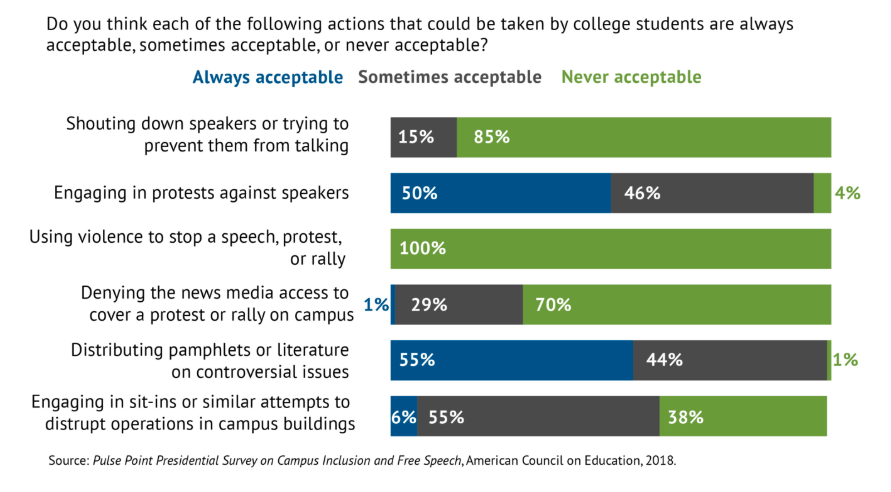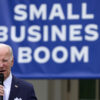Attorney General Jeff Sessions spoke to students Tuesday at the Turning Point USA High School Leadership Summit in Washington, D.C. He also joined The Daily Signal for an exclusive interview about his views on free speech and the Department of Justice’s recent actions on the issue. An edited transcript of the interview is below.
Rob Bluey: Attorney General Jeff Sessions, it’s great to be with you.
Jeff Sessions: Thank you. It’s good to be with you. And I think high school students often form their basic values in high school. I sort of did.
Bluey: Certainly. Me, too.
Sessions: What you do in high school often does reflect your philosophical approach to life. Your values, political views are shaped often in high school, in families, and there’s nothing wrong with that. But it’s an interesting opportunity to speak to these young people.
Bluey: It could be a life-changing experience to hear from so many powerful speakers, including the attorney general of the United States. What message do you hope to leave them with today?
Sessions: I’m going to leave them with the message that what they do makes a difference. That they should arm themselves intellectually for the battles that will be coming and [that] they face when they get into the universities. I’m going to affirm with detail the value of free speech and debate in America.
They have to be strong, and be prepared, and not be afraid, because truth tends to win out.
Because there’s clearly a one-sided view, often in the universities and colleges in America, and that young people who adhere to traditional, more conservative values often find a hostile environment. They have to be strong, and be prepared, and not be afraid, because truth tends to win out.
Bluey: Your department, under your leadership, has taken a role in which it’s trying to protect that free speech of college students. And in one case in particular, at the University of Michigan, where they have a bias-response team, you decided to intervene in that case. Can you tell us why the Department of Justice chose to get involved?
Sessions: They had such a vague standard for speech like bias, I think, and some other phrases that they used without any legal tradition, no clear definition. And basically, it sets an improper standard or limitation on the right of Michigan students to be able to speak.
Now, we filed our complaint or joined in the complaint against the University of Michigan, which we have a right to do legally. And I think the next day, they withdrew and are re-evaluating their position. So, I think the action by the students, our joining in that action, helped them to realize that this is not consistent with the Constitution. The Constitution is clear about speech.
Bluey: When would you suggest that policymakers get involved? And what steps can they take, maybe at the state level when these free speech debates pop up?
Sessions: I do think that regardless of your politics, state universities need to be objective and fair. They need to let both people, both sides of an issue, have an opportunity to speak. That’s tradition in American universities.
The Constitution is clear about speech.
I mean, the core of free speech has always been centered in our colleges and universities for young people forming their values that shape them for years to come.
So, I do think that state legislators and administrators have a right to be concerned if a university is only having one side of the issue promoted. And in fact, what it can often in reality amount to is that the state is funding a group of people to advocate for a certain political position, which isn’t appropriate.
Bluey: I want to ask about a recent poll that showed that as many as 15 percent of university presidents felt it was OK for protesters to shout down speakers that they disagreed with. It’s known as the “heckler’s veto.” Is that concerning or troubling to you, that these leaders of these college campuses think that it’s OK to engage in that behavior?
Sessions: It’s extremely troubling. It’s almost amazing. What we were taught, and what I think the American tradition teaches, is that you respect other people’s views. You engage them at an intellectual level, not a personal level, and you allow them to have their say.
The idea that university presidents would support groups who go in deliberately to intimidate, threaten, and block a person’s right to freely discuss an issue is a threat to our freedom.
The idea that university presidents would support groups who go in deliberately to intimidate, threaten, and block a person’s right to freely discuss an issue is a threat to our freedom, and it’s contrary to the Constitution.
We have a right to assemble, and we have a right to free speech. That’s what the free speech clause is all about, actual debate on substantive issues.
That’s what the Founders had in mind. They believed that out of the cauldron of debate that truth emerged.
They also believed in objective truth. They believed there is a right and truthful answer to most problems, and our duty here is to try to figure out what the truth is and then make the right decision. And that comes from debate.

Bluey: What about the role of law enforcement when sometimes these protests turn violent? What role would you suggest law enforcement play here?
Sessions: They have a role. We had the situation, I think, at Middlebury College, where the speakers are conservative, and the liberal was a faculty member, was assaulted and actually injured—I think had to go to the hospital. So yes, I think police have a right and a duty [to intervene].
We learned that in the civil rights days. People have a right to march. They have a right to speak, and they cannot be blocked or intimidated, and police have a responsibility to protect that right.
Bluey: What should students know about their rights and their ability to bring speakers—sometimes controversial—to their campuses?
Sessions: Well, I think they should know their rights. And to know that they can invite, and should be able to invite—according to reasonable rules of the university—speakers that may be controversial. And that they should push back if people try to intimidate them from doing so.
I just believe that it’s really excellent where young people think through their rights, prepare themselves to defend them, and don’t back down when they’re convinced that they are doing the right thing.
Bluey: And finally, I want to ask you a personal question, because you’re somebody that we’ve long admired at The Daily Signal for your approach to civility, and tolerance, and engaging with people on the other side, despite the fact that you’ve come under attack from opponents, and critics, and the press. How do you approach it personally, and stay strong in your personal beliefs?
Sessions: Sometimes you’re just not able to enter into every debate with every critic. The attorney general’s got 300 million constituents-plus and has to advance issues properly.
So, one of the things we want to do is advance and challenge the mindset and the actions of some who are blocking free speech on campus.
I would urge young people, when you’re in a hostile environment, to be careful. Be prepared, but don’t back down when you think you’re defending true values.
For example, we believe that crime had surged actually the last two years before President Trump took office, and our job is to bring that crime rate down, and we’re prepared to defend and advocate those issues on the merits, honestly and effectively. …
Sometimes, it may be better to have a good, hot debate, and we’re willing to do that sometimes. I think that truth tends to win out. I believe there is such a thing as truth, objective truth. …
I would urge young people, when you’re in a hostile environment, to be careful. Be prepared, but don’t back down when you think you’re defending true values.
Bluey: Attorney General Jeff Sessions, thanks so much for visiting The Daily Signal.
Sessions: Thank you. Good to be with you.
>>> Related: Defend Free Speech as ‘Precious and Rare,’ Sessions Tells High Schoolers




























